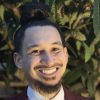Josh Schuschke’s scholarly focus on Black academic identity across multiple media springs from two wells. Growing up in a multiracial family in Louisville, Kentucky, he embraced his Black identity and the emergence of social media equally.
It was helping to organize Louisville’s Black Lives Matter movement as a University of Louisville undergraduate and graduate student, though, that coalesced his passion for how racial identity is forged and furthered on social media, film, and TV.
“[During the 2014 BLM,] through Black Twitter, people participated in and learned from discussions about race from Black organizers, activists, scholars, and others who are part of the Black experience,” says Schuschke, who holds a PhD in Educational Psychology with a special focus on intersectional educational experiences from the University of Southern California’s Rossier School of Education’s Urban Education Policy program. Today, with the pandemic’s spotlight on educational technology and the nation’s ongoing focus on social justice, online discourse on race, he says, is essential.
Schuschke begins his tenure as an assistant professor in the Johns Hopkins School of Education’s Digital Age Learning and Educational Technology (DALET) program on July 1, following a postdoctoral fellowship in antiracist education at American University’s School of Education.
“Josh is a scholar, teacher, and more humanistically oriented researcher who is going to help SOE and our teachers address how to use educational technology to influence diversity, equity, and inclusion in the classroom,” says Assistant Professor James Diamond, PhD, the program’s faculty lead. “This is an area where we can really distinguish DALET.”
Schuschke will teach the Culturally Responsive Teaching course that explores the intersection of inclusive pedagogies and educational technology implementation. He’s also creating a new course, Implementing Social Media in the Classroom. “It will prepare educators to use social media as tools and spaces for learning and identity development by highlighting the unique affordances and limitations of platforms,” explains Schuschke, who is thrilled about new opportunities for his research at SOE.
“I am interested in studying the ways Black youth use technologies to encourage curricular and extracurricular forms of collective political/civic engagement and identity development,” Schuschke adds. “DALET and Hopkins have abundant resources and experts for cross-disciplinary explorations. I can’t wait to work with a group of scholars—at SOE, in communications, public health, in Baltimore—about the rise of Black identity in social and popular media.”

